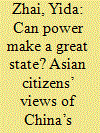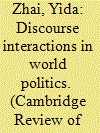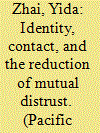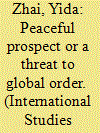|
|
|
Sort Order |
|
|
|
Items / Page
|
|
|
|
|
|
|
| Srl | Item |
| 1 |
ID:
143614


|
|
|
|
|
| Summary/Abstract |
With its rapid economic growth, China has become the second largest economy. At the same time, a rapid increase in its defense expenditure and expanding maritime ambitions have raised concerns among other Asian nations. Moreover, by displaying its economic and military might China’s recent assertive actions in the East China Sea and South China Sea seem to “prove” longstanding worries regarding China’s threats. This article reviews the traditional Chinese philosophy of the great state and argues that China unfortunately deviates from it. Cross-national survey data show that Asian citizens widely acknowledge the rising power of China. Nevertheless, an expansion of economic and military power fails to yield more positive evaluations. The country’s pursuit of power and blunt foreign policy push neighboring states to welcome an expansion of Japan’s military role and to intensify their security ties with the United States to achieve a balance of power. There needs to be a shift in China’s foreign policy to earn trust and respect from its Asian neighbors. Power can create a hegemon but it definitely will not make China a great state
|
|
|
|
|
|
|
|
|
|
|
|
|
|
|
|
| 2 |
ID:
183519


|
|
|
|
|
| Summary/Abstract |
Discourse, as a constructive power, plays a significant role in world politics. Rather than focusing on the formation or transformation of a single discourse, we investigate discourse interaction in the context of multiple competing discourses. Based on the theories of discourse interaction, this study analyses the realist dimension of discourse by examining the territorial dispute between China and Japan over the Diaoyu/Senkaku islands and shows how the two countries use discourses to pursue their own security and respective realist interests. This analysis identifies five major controversies in the two countries’ discourses on their claims of sovereignty over the islands and demonstrates that each of the two states uses both complementary and competing discourses to strengthen its own stance and delegitimize the other’s claims. The theoretical analysis of discourse interaction not only contributes to the growing research on discourse practices in IR, but also has important implications for practice-oriented strategic communication.
|
|
|
|
|
|
|
|
|
|
|
|
|
|
|
|
| 3 |
ID:
161515


|
|
|
|
|
| Summary/Abstract |
Using a mixed-methods approach, this article surveys and compares how Chinese youth view China’s rise with how their Asian counterparts do. The quantitative analysis uses data from the Asian Student Survey to identify the differences in perception of China’s rise between Chinese and Asian youth. Qualitative interviewing is undertaken to probe and assess the reasons behind the gap. The results show that Chinese youth are more optimistic about political stability and nationalism accompanying China’s rise. Nevertheless, they are open to acknowledge a variety of social problems in the wake of economic growth. With regard to China’s international influence, most Chinese youth have a firm faith in China’s peaceful rise, but they also perceive threats from other countries that are normally ignored in the China threat thesis. Chinese youth tend to attribute the negative evaluations of China among Asian counterparts to external reasons rather than see them as reflections of China’s ‘problematic’ foreign policy. Interview materials show why and how Chinese foreign policy is justified among Chinese young people. They open a door for outsiders to understand Chinese public opinion toward international politics.
|
|
|
|
|
|
|
|
|
|
|
|
|
|
|
|
| 4 |
ID:
151439


|
|
|
|
|
| Summary/Abstract |
In the midst of rising tension between China and Japan, two powerful countries in Asia, the favorable attitudes of each country's citizens toward the other country have dropped to a historical low. The Taiwan issue, historical legacy, island disputes, and maritime resource competition are major obstacles in Sino-Japanese relations, but the most fundamental issue is a deep-seated mutual distrust and suspicion between the two countries, which result in rising threat perceptions. Beyond the structural and political elite-centered approaches, this study examines the evidence related to the three approaches (face-to-face contact, cross-cultural exposure, and social identity) to reduce mutual distrust and antipathy in the two countries. With a careful analysis of the survey data, this study sheds light on the conditions under which contact (a) results in improved attitudes toward outgroup, (b) has little or no effect on intergroup relations, and (c) yields more prejudice and hostility toward the outgroup. The findings of this study not only identify factors that could facilitate mutual understanding between Chinese and Japanese people and more favorable impressions of one another, but are also relevant to planning interventions to reduce prejudice and distrust among people from different races, religions, and countries.
|
|
|
|
|
|
|
|
|
|
|
|
|
|
|
|
| 5 |
ID:
164451


|
|
|
|
|
| Summary/Abstract |
This article investigates youth perceptions of China's rise in seven Asian societies. Unlike previous studies’ findings that most Asians hold positive views of China's influence, this study finds that Asian youth view a rising China more coolly than does the general public. Even though they acknowledge that China's rise offers increased opportunities, Asian youth tend to strongly distrust and worry about the negative influence of China. The results show that most youth in Asian countries surveyed believe China's rise will challenge global order and that China will not maintain peaceful relations with other Asian countries. Multilevel analyses show that both microlevel personal traits and macrolevel structural factors can account for how Asian youth view China's rise. The results indicate that China has not successfully convinced young Asian citizens of its determination to rise peacefully. China's foreign policymaking should take greater consideration of Asian public opinion rather than be dominated by wishful thinking.
|
|
|
|
|
|
|
|
|
|
|
|
|
|
|
|
| 6 |
ID:
172709


|
|
|
|
|
| Summary/Abstract |
Democracy is a contested concept; this article empirically examines how Chinese people understand the concept of democracy in practice when they use this term. Using four rounds of national survey data, we seek to clarify the characteristics of the Chinese people’s perception of democracy and its longitudinal changes during the past few decades. The results show an increase in the percentage of people who view democracy procedurally. The popular perception of democracy does matter. People who view democracy substantively tend to see democracy as less suitable for China, and to overrate the democratic level of the current regime, compared to those who view democracy procedurally. No matter how people perceive it, satisfaction with democracy has declined over the past decade. The demographic analysis shows that Chinese youth adhere to a procedural concept of democracy more than a substantive one, which has important implications for China’s future political development.
|
|
|
|
|
|
|
|
|
|
|
|
|
|
|
|
| 7 |
ID:
159766


|
|
|
|
|
| Summary/Abstract |
Chinese traditional culture is viewed to sustain political trust in the authoritarian regime. Given that Chinese cultural traditions are complex and multi-dimensional, it is ineffective to deal with this notion by a single index. This study divides Chinese traditional values into a non-political dimension (traditional family and social values) and a political dimension (traditional political values). Then, I empirically test how different dimensions of Chinese cultural traditions shape the ordinary people’s orientations toward their political institutions and government officials. The results show that the impact of traditional values on political trust varies by its different dimensions. Traditional political values and social values are positively correlated with both institutional trust and trust in government officials. Traditional family values are positively correlated with trust in government officials but do not have an effect on institutional trust. Liberal democratic values negatively correlate with trust in government officials, but this effect on institutional trust is not significant.
|
|
|
|
|
|
|
|
|
|
|
|
|
|
|
|
|
|
|
|
|